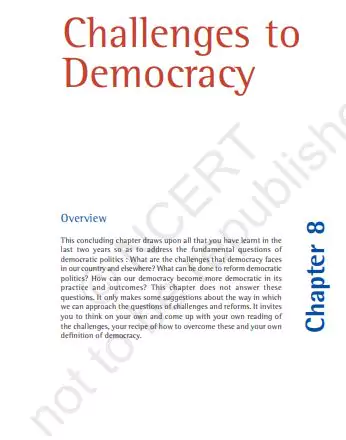‘NCERT Solutions for Class 10 Social Science Chapter 8 Challenges to Democracy‘ PDF Quick download link is given at the bottom of this article. You can see the PDF demo, size of the PDF, page numbers, and direct download Free PDF of ‘Ncert Class 10 Social Science Chapter 8 Exercise Solution’ using the download button.
Challenges to Democracy Book PDF Free Download

Chapter 8: Challenges to Democracy
Do you remember the first chapter of your Political Science textbook of Class IX? There we tracked the expansion of democracy all over the world in the last hundred years. Our reading thereafter has confirmed our initial impression: democracy is the dominant form of government in the contemporary world.
It does not face a serious challenger or rival. Yet our exploration of the various dimensions of democratic politics has shown us something else as well. The promise of democracy is far from realised anywhere in the world. Democracy does not have a challenger, but that does not mean that it does not face any challenges. At different points in this tour of democracy, we have noted the serious challenges that democracy faces all over the world.
A challenge is not just any problem. We usually call only those difficulties a ‘challenge’ which are significant and which can be overcome. A challenge is a difficulty that carries within it an opportunity for progress. Once we overcome a challenge we go up to a higher level than before. Different countries face different kinds of challenges. Can you recall the map of democratic governments in the year 2000 that was included in your textbook?
At least one fourth of the globe is still not under democratic government. The challenge for democracy in these parts of the world is very stark These countries face the foundational challenge of making the transition to democracy and then instituting democratic government. This involves bringing down the existing non-democratic regime, keeping military away from controlling government and establishing a sovereign and functional state.
Most of the established democracies face the challenge of expansion. This involves applying the basic principle of democratic government across all the regions, different social groups and various institutions. Ensuring greater power to local governments, extension of federal principle to all the units of the federation, inclusion of women and minority groups, etc., falls under this challenge. This also means that less and less decisions should remain outside the arena of democratic control.
Most countries including India and other democracies like the US face this challenge. The third challenge of deepening of democracy is faced by every democracy in one form or another. This involves strengthening of the institutions and practices of democracy.
This should happen in such a way that people can realise their expectations of democracy. But ordinary people have different expectations from democracy in different societies. Therefore, this challenge takes different meanings and paths in different parts of the world. In general terms, it usually means strengthening those institutions that help people’s participation and control.
This requires an attempt to bring down the control and influence of the rich and powerful people in making governmental decision. We have noted or hinted at these challenges in all the various examples and stories that we studied in our textbook of Class IX and in the earlier chapters of this book.
Let us go back to all the major stops in our tour of democracy, refresh our memory and note down the challenges that democracy faces in each of these. Now that you have noted down all these challenges, let us group these together into some broad categories.
Given below are some spheres or sites of democratic politics. You may place against each of these the specific challenges that you noted for one or more countries or cartoons in the previous section. In addition to that write one item for India for each of these spheres. In case you find that some challenges do not fit into any of the categories given below, you can create new categories and put some items under that.
| Author | NCERT |
| Language | English |
| No. of Pages | 12 |
| PDF Size | 0.7 MB |
| Category | Social Science |
| Source/Credits | ncert.nic.in |
NCERT Solutions Class 11 Social Science Chapter 8 Challenges to Democracy
Challenges to Democracy CBSE Class 10 Democratic policies NCERT Question-1
Writing your own definition of a good democracy.
Solution:
A country, with a government that has been elected freely and equally, by all its citizens, is a good Democracy. It is a system of government based on the principle of majority decision-making. A democracy is the control of an organization by its members, who have a free and equal right to participate in the decision-making processes.
“Democracy is like the experience of life itself – always changing, infinite in its variety, sometimes turbulent and all the more valuable for having been tested for adversity.” – Jimmy Carter, American President, in his speech to the Indian Parliament.
Challenges to Democracy CBSE Class 10 Democratic policies NCERT Question-2
Features of a democracy.
Solution:
1.A democracy should have the power to change its rulers if they are not good.
2. It should reduce social and economic difference among all its citizens.
3. All people should have equal rights and opportunities irrespective of their caste creed or religion
4. Minorities have to be included in the decision making process
5. Gender discrimination should not be encouraged
6. Money power should not play a role during elections
7. The government should work within the frame of the constitution
NCERT Class 11 Social Science Textbook Chapter 8 With Answer PDF Free Download
